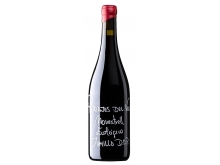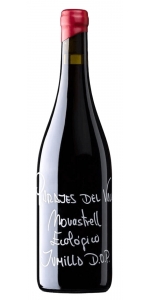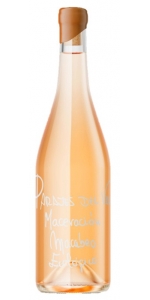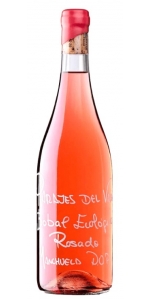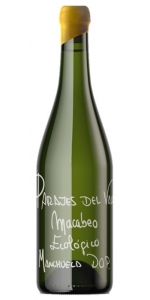Parajes del Valle Jumilla Monastrell Ecologica 2022
| Country: | Spain |
| Region: | Jumilla |
| Winery: | Parajes del Valle |
| Grape Type: | Mourvedre |
| Organic: | Yes |
| Vintage: | 2022 |
| Bottle Size: | 750 ml |
Full of life, crispy red fruit, with balsamic notes, easy to drink, representing the Mediterranean character.
As a light red wine, it pairs well with tapas, charcuterie, rice dishes, or pizza. It can even complement desserts. The high acidity will take you on a surprising journey.
Full of life, crispy red fruit, with balsamic notes, easy to drink, representing the Mediterranean character.
As a light red wine, it pairs well with tapas, charcuterie, rice dishes, or pizza. It can even complement desserts. The high acidity will take you on a surprising journey.
Parajes del Valle Manchuela Macabeo Ecologico Orange Wine is 100% Macabeo.
Mineral and citrus notes.
Perfect to accompany grilled seabass or smoked fish.
Parajes del Valle Manchuela Bobal Ecologico Rose is an organic 100% Bobal Rose.
Floral and fresh wine. Excellent option to combine with cheese goat and walnuts salad, or with a platter of smoked salmon.
Mineral and citrus notes.
Fresh and elegant.
RS : 2g/liter
TA : 5.5g/liter
Full of life, crispy red fruit, with balsamic notes, easy to drink, representing the Mediterranean character.
As a light red wine, it pairs well with tapas, charcuterie, rice dishes, or pizza. It can even complement desserts. The high acidity will take you on a surprising journey.
Viticulturists since 1982. Our family embarked on this adventure, responding to the desire to make sincere wines, with personality, that convey the purity of our land through sustainable viticulture. Effort, perseverance, and dedication have brought us here, while enthusiasm and passion drive us towards the future. In 2012, Parajes del Valle winery joined the group, located in Jumilla, with the purpose of continuing this project of making sincere and personality-filled wines.
From Parajes del Valle, we produce high-quality, elegant, and balanced wines, very expressive and tasty. They are honest and respectful of their typicity, carrying a high concentration of color and aromas and showing delicacy and complexity, a carefully crafted, authentic, and personal way of interpreting the varieties of the D.O.P. Jumilla and D.O.P. Manchuela. Our vineyards are certified by Organic Agriculture, grown in goblet training system and strict dry farming, rescuing traditional viticulture and minimizing impact on the environment. We advocate for minimal intervention, carrying out only the necessary tasks and caring for our vines so that they produce in a balanced way and provide us with the best raw material for our wines. Our plots are located at altitudes between 600 and 800 m, always seeking shady areas and proximity to the mountains to obtain fresh and balanced grapes.
- back
Vinsacro Dioro Seleccion is made from 100% Vidau (Blend of the de varietals Tempranillo, Graciano and Mazuelo with predominance of 70+ years old Garnacha).
A wine to enjoy.Vinsacro Dioro, a wine inspired by the Egyptian, Greek and Roman cultures that worshipped wine and gave it a sacred meaning associated with joy and festivity. It is the fruit of our best vineyards, living witnesses to the work and passion of the four generations that preceded us.
Intense cherry red color. Very expressive on the nose with aromas of good ripeness, balsamic nuances, mineral notes and a very elegant vanilla background. Tasty and full-bodied on the palate, ripe and rounded tannins with a complex and pleasant finish that invites you to order another glass.
Pair with Roast lamb or pork, game, beef steaks, stewed meats. During the aperitive, it will accompany as well with aged and blue cheese.
14% Vol.
Grapes selected manually from our vineyards located on the southern slopes of Monte Yerga in the “Cuesta la Reina” estate. Grapes that are harvested with the utmost care, transported at low temperature in fruit boxes to the winery to avoid any damage to the fruit.
Fermentation is carried out with indigenous yeasts and the wine is kept in maceration for 30 days while breaking the cap daily. Afterwards, the wine is transferred to oak barrels where it remains for 17 months before bottling.
Reviews:
"Really sophisticated and polished with vanilla, coffee, earth and spice scents and oaky flavours. Long, brooding finish."
- Decanter World Wine Award (April 2022), 94 pts
"The 2019 Vinsacro Dioro Selección is a Vidau field blend sourced from Monte Yerga in Rioja Oriental. Aged for 18 months in French and Eastern European oak barrels, it is only released after five years in the cellar. Dark garnet in color, time in the glass reveals soy sauce, bay leaf and thyme notes, along with black fruit and chutney-like undertones. Dry and rich on the palate, it flows with softened tannins and a clingy mouthfeel, lingering long with an impression of tomato leaf. This is a complex, nuanced and solar red that will warmly captivate your palate. - Joaquin HIDALGO"
- Antonio Galloni's Vinous (April 2024), 94 pts
'Ma Belle-Fille' was named by Sir Peter as a warm tribute to Emily Michael, his "Daughter-in-Law", and mother of the third generation of the family. Planted at the highest elevation on the estate, the marine influence on Ma Belle-Fille vineyard is greater, resulting in cooler daily temperatures in the summer and autumn months. Situated above the summer fog ceiling and exposed to the southeast, the vineyard receives the very first rays of sunshine each morning and remains sunny all day long. This full exposure, combined with cooler temperatures, causes the fruit to mature earlier than the rest of our estate.
Vintage Notes
The combination of a wet winter with significant rains in December through March and cool weather delayed budbreak nearly a month. Flowering and fruit set were also pushed back and the weather during the later flowering was favorable resulting in decent fruit set and slightly above average yields for the Chardonnay vineyards—a marked improvement over the record-low yielding 2022 vintage. The growing season was temperate without major heat spikes allowing the berries to hold onto their acidity which carried through into the wines. Harvest was almost a month later than normal with the last Belle Cote block coming in on November 2nd.
Winegrowing Notes
At the highest elevation on the estate, the marine influence on Ma Belle-Fille is greater, resulting in cooler daily temperatures in the summer and autumn months. Situated far above the summer fog ceiling and exposed to the southeast, the vineyard receives the very first rays of sunshine each morning and remains sunny all day long. This full exposure, combined with cooler temperatures, causes the fruit to mature earlier than the rest of our estate.
Winemaker's Tasting Notes
Beautifully perfumed with layers of honeysuckle, jasmine and dried orange peel accented by apricot, vanilla cream and spring flower notes, the 2023 ‘Ma Belle-Fille’ delivers with a rich, creamy entry and generous, structured mid-palate showing great drive and intensity with a long, mouth-watering finish. A truly special wine from an extraordinary vintage.
Review:
So delicious and drinkable from the first whiff to the lingering finish. An uber-chardonnay that packs in all the richness of fruit and smooth spiciness of oak fermentation, with vibrant acidity and a silky texture. Well balanced in a cool, ideal vintage and a great candidate for aging longer term. Drinkable now and best from 2030.
James Suckling 99 Points

